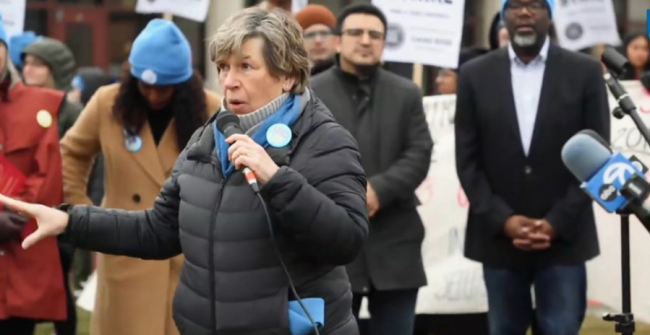You have /5 articles left.
Sign up for a free account or log in.

AFT president Randi Weingarten addressed a rally of striking UIC faculty members Tuesday.
American Federation of Teachers
University of Illinois at Chicago faculty members began striking Tuesday after their union said 12 hours of negotiations with administrators on Martin Luther King Jr. Day didn’t produce an agreement.
“We passed proposals back and forth with the management team from 10 a.m. until 10 p.m., when they passed us a counter that indicated that they had no interest in resolving our differences,” the union, UIC United Faculty, wrote on its website.
“While they did send a message to the UIC community reaffirming a commitment to student mental health, they continue to ignore our concrete proposals on [student] disability assessment and including faculty in ongoing conversations about expanded mental health resources,” the union wrote. “They remain stuck on an annual annual [sic] raise of 4.25 percent, and a minimum starting salary of $54,000.”
The strike continues. Charitianne Williams, a senior lecturer in the university’s English department and a bargaining team member, said negotiations are scheduled to resume sometime this afternoon.
“I am looking forward to this strike ending and getting back in the class with my students,” Williams said. “But in the meantime, we’ll be out here as long as it takes.”
Williams said she couldn’t say how many classes were canceled Tuesday.
“There are still classes going on,” she said. “Graduate students and adjunct faculty, so folks that just teach like one or two classes, are not protected by our contract, so they’re not allowed to strike. It’s really impossible to say. Our union represents, you know, 1,500 bargaining unit members. Of that 1,500, over 850 are union members. I would expect that all of those union members are observing the strike.”
With chants sounding behind her during a phone interview, she said, “I can tell you that I’m standing in the middle of the quad right now, looking around, and I don’t see any classes in session.”
The university declined to provide an interview Tuesday.
In a joint statement, Javier Reyes, interim campus chancellor, and Karen Colley, acting provost and vice chancellor for academic affairs, wrote that “this work stoppage is disappointing and not in the best interest of the university or our students. However, UIC fully respects the rights of its employees under the Illinois Educational Labor Relations Act and other applicable laws.”
They said the union members have the right to work or to strike, but those who choose to strike will not be paid during it.
“Classes and labs will be held as scheduled in the Colleges of Medicine, Dentistry, Pharmacy and School of Law, as the bargaining unit does not represent faculty in those areas,” they said in the statement. “Teaching assistants are expected to hold their regularly scheduled classes, labs and office hours. In addition, if there are interruptions in class and lab schedules during a strike, make-up arrangements must be implemented to ensure that the instructional objectives are met.”
The union said its contract with the university expired in August. Negotiations began in April, and federal mediation began Oct. 31.
The local union—which says it represents faculty who are tenured, tenure track and full-time non–tenure track—urged all members to join picket lines from 10 a.m. to noon and 1 to 3 p.m., and a noon rally on the quad.
The union is affiliated with the American Association of University Professors and the American Federation of Teachers. Tuesday’s quad rally featured AFT national president Randi Weingarten, and AFT streamed the event online.
“Freedom means real freedom, means intellectual freedom, means academic freedom,” Weingarten shouted to the crowd, saying faculty should be treated like “freedom fighters.”
And she said the COVID-19 pandemic’s impact on student mental health is “everybody’s business in this city. Of course it’s your business, and that is what bargaining for the common good means.”
UIC, which enrolled about 34,200 students as of last fall, said on its website that the Martin Luther King Jr. Day meeting was its 31st with the union and the 12th including the federal mediator.
In response to the union’s request for expanded student mental health resources, the university’s website said it “announced an approved $4.47 million plan to enhance student mental health services and continues to insist that a clause regarding student services does not belong in a faculty employment contract.”
The union is requesting, among other things, a $61,000 minimum salary for non-tenure-track faculty and $77,000 for tenure track, and a $3,000 base salary increase for all faculty in the first year of the contract, Williams said. In the last contract with the bargaining unit, the minimum salary for non-tenure-track faculty was $50,000 and the minimum for tenure track was $65,000.
The university is offering a $54,000 minimum salary for non-tenure-track faculty that would grow to about $58,400 by the fourth and final year of the proposed new contract, and a minimum $67,600 for tenure-track faculty that would grow to $70,300 by year four.
So, even in four years, the minimum salary would be below the union’s current request.
The university is also offering a one-time, $4,000 lump sum payment during the four-year contract, instead of the $3,000 base salary increase for all faculty. The union is also pushing for a three-year contract, while the university says it wants a four-year one.
The university says it and the union have reached “tentative” agreements on various issues, starting in May, shortly after negotiations began, but ending with the last tentative agreement in mid-December.
“The sides have reached a tentative agreement on 17 of 23 items,” the university wrote.
Williams, however, said, “The management team has been stalling from the beginning.”




